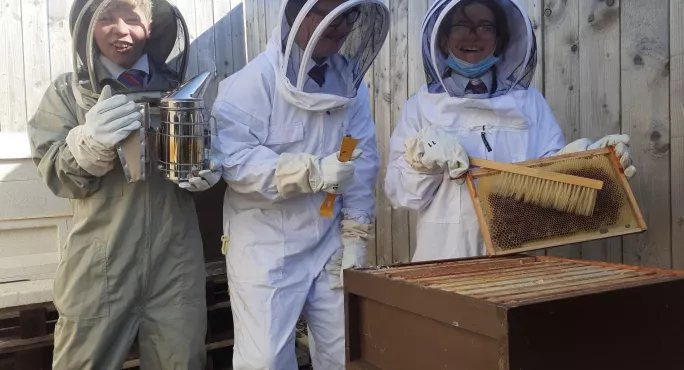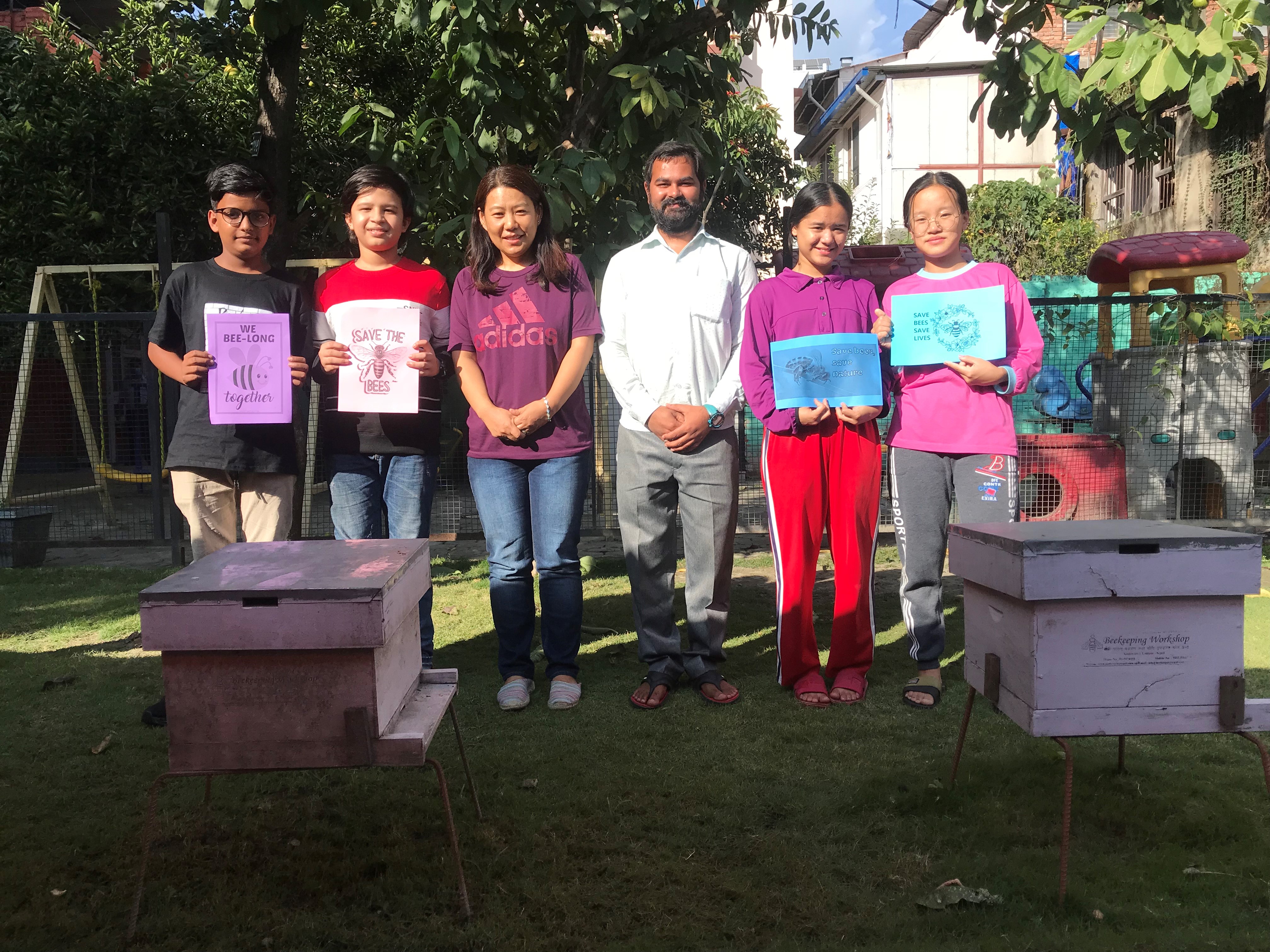Create a buzz about climate change in your school

Humans have collected beeswax and honey from wild bees for almost 9,000 years. And, in more recent times, the likes of Michelle Obama, Scarlett Johansson and Pope Francis have joined the ranks of the world’s most high-profile beekeepers.
But there’s far more to bees than their outputs. As pollinators, they play a critical role in food production across the globe, yet an alarming decline in numbers, driven mainly by urbanisation and pesticide use, has led scientists to declare bees an endangered species. And what would a world without bees look like? The impact on the environment, and knock-on effect for climate change, would be severe as bees are crucial to our ecosystems and biodiversity.
While this is a global issue, there’s plenty we can do to show young people what can be done on a local level.
One species to focus on is the honey bee. Despite being only one of 275 species of bee in the UK, the fact that they are so well known makes them an instant hit with young students, and an excellent way to initiate broader discussions about the environment, as sustainable beekeeper Jennifer Moore explains.
“Bees forage up to three miles from the hive, and that simple fact directs everyone’s attention to the local area: is it a bee-friendly environment? Can we work to make it better?”
Bee projects in schools: learning about climate change and sustainability
At West Rise Junior School in Eastbourne, Moore works alongside headteacher Mike Fairclough to lead the school’s bee project. However, unlike many similar projects in educational settings, the approach is very much hands-off.
“Initially, teachers and students find the fact that we don’t open up the hive and extract the honey surprising,” explains Moore. “But it’s important to realise that installing bees in school is really a beginning - a way of focusing attention on why bees are important and creating surroundings where they can thrive - and not an end in itself.”
Simply observing the bees has cultivated a deeper appreciation of the natural world and the benefits of spending time outdoors among pupils.
“The children understand that bees are affected by vibrations, and that they have to be very still and quiet when we have our sessions. It’s very calming and mindful,” Moore says.
”The undisturbed area around the beehive also encourages numerous other species, such as slowworms and grasshoppers, and this helps to reinforce the idea that all wildlife needs our help.
“We make seed bombs and bug hotels, showing the children that in order for bees to be healthy, we need to make it a rich place for all species, and in turn how they can provide food and habitat for the wildlife in their gardens, and to protect them rather than be afraid.
“This literal grassroots approach is vital to make the younger generation aware of our impact on the wider environment, and [teach them] to respect and value the wild spaces that we have, and the creatures with whom we share our world.”
International partnerships and local learning
Similarly, Cardinal Allen Catholic High School, near Blackpool, has created a big undisturbed area within its school grounds that it uses to teach students about promoting and protecting wildlife. It began a pioneering series of sustainability projects with the planting of a woodland area over 30 years ago.
Since then, students have planted around 4,000 trees, established an orchard, a wildflower meadow and allotments, and, most recently, they have installed four beehives housing over 200,000 bees.
“Bees kept coming up in our school eco group’s discussions,” explains Andy Harding, community coordinator at Cardinal Allen. “Their pollination work is absolutely vital to support food production, to provide habitats for all sorts of wildlife, and has great value to the economy.
“Initially, we focused our attention on creating bee-friendly habitats around school before taking things further by introducing the hives.”
And the project has rapidly evolved, with students developing their own website, selling honey and wax and reinvesting the profits to pay for more equipment and materials. The project has also been commended by the Queen’s Commonwealth Trust.
To expose students to a different perspective on climate and sustainability issues, Cardinal Allen partnered with Galaxy Public School in Kathmandu, Nepal, through the Connecting Classrooms through Global Learning programme, supported by the British Council and UK Aid.
“We felt speaking to young people and teachers in other countries about the issues which connect us would be a great way to broaden our students’ horizons and bring climate change alive,” says Harding.
“And despite our different settings, we’ve learned that we have more in common in terms of climate and environmental threats than we thought - pollution, flooding and so on.”
Following Cardinal Allen’s lead, Galaxy Public School installed two beehives, and although the project has faced challenges - the bees failed to produce honey initially, and the coronavirus pandemic curtailed access to the hives - the schools are collaborating to find ways to mediate the impact of their urban location.
“Whereas Cardinal Allen is surrounded by extensive green space, our school is in the middle of the city,” says Surina Gurung, Galaxy’s principal. “When the bees failed to produce honey, Cardinal Allen students encouraged us to look more closely at the surrounding environment. Is there enough food for the bees? How can we provide more?
“Plus, we shared lots of contextual conversations about why this is so important for sustainable food production and healthy ecosystems.”
The partnership has been instrumental in revealing commonalities between students who live in very different communities and climates. And both Gurung and Harding feel strongly that their school partnership has proven a valuable introduction to how individuals and countries can work together to try to solve some of the major issues facing our world.
“It’s just astonishing to watch them interact and learn from each other,” says Harding.

Back to buzzness
So with World Bee Day approaching on 20 May, what advice do apiarists and eco enthusiasts have for teachers looking to inspire their students?
Starting small and focusing on creating a more bee-friendly environment - rather than diving straight in with a hive - is sometimes key, especially for urban schools with limited space.
For Holly Egan, a Year 11 student at Cardinal Allen and the bee project’s international lead, the secret is to show young people that they can make a difference.
“At our age, it’s easy to think that no one will listen. But we had huge success with an anti-fracking campaign where we highlighted the threat to our woodland area, all initiated here at school,” she says.
And for Harding, partnering with Galaxy Public School has proven a great way to boost this sense of ownership and empower students. He says the opportunities for ongoing conversations and the sharing of ideas between the partner schools have helped to develop his students into much more globally focused citizens.
“We’ve put a lot of time and effort into cultivating an interest in environment and climate issues among our students, and helping them to understand that this doesn’t just affect them - it’s a worldwide issue,” he says. “As soon as you’ve harnessed students’ self-belief and aspiration, it takes over the project and carries it on.”
“We live in an increasingly small and connected world, and there are so many opportunities for schools to support students to make those connections and really make a difference.”
Connecting Classrooms through Global Learning offers fantastic opportunities to work with an international partner school and make a difference on global issues such as climate change, plastic pollution, pandemics, gender equality and many more. Our local advisers can help you to get your collaboration started with free support, online training and resource packs to make your projects world-class. For schools wishing to go the extra mile, there is even partnership funding to make your ideas a reality.
